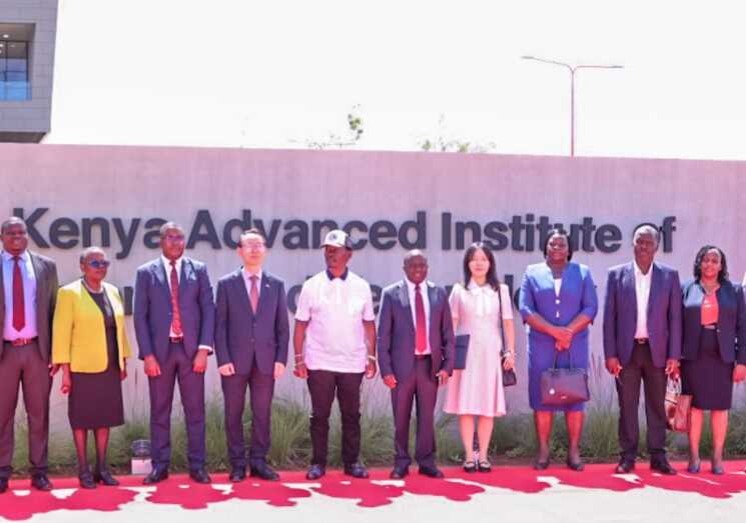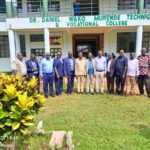The Kenya Advanced Institute of Science and Technology (Kenya-AIST), located in the heart of Konza Technopolis, is a beacon of innovation and academic excellence in East Africa. Established to address the region’s demand for highly skilled engineers and scientists, Kenya-AIST is a postgraduate-only institution modeled after the prestigious Korea Advanced Institute of Science and Technology (KAIST). With a mission to drive Kenya’s Vision 2030 and transform the nation into an industrialized, knowledge-based economy, Kenya-AIST offers cutting-edge Master’s and PhD programs in engineering, technology, and biotechnology.
Why Choose Kenya-AIST for Postgraduate Studies?
Kenya-AIST is not just another university; it’s a specialized institution designed to foster advanced research and innovation. Here’s why it stands out:
- Strategic National Importance: Established under the Ministry of ICT and as a constituent college of Dedan Kimathi University of Technology in 2022, Kenya-AIST is a cornerstone of Kenya’s economic and technological transformation.
- World-Class Curriculum: Developed in collaboration with KAIST, the curriculum emphasizes practical, industry-relevant skills and cutting-edge research.
- State-of-the-Art Facilities: Located in Konza Technopolis, the institute boasts modern labs and research centers, providing an ideal environment for postgraduate studies.
- Focus on Industrialization: Courses are tailored to meet the demands of Kenya’s Vision 2030, equipping graduates to lead in sectors like infrastructure, energy, and agriculture.
- Global Partnerships: Collaborations with international institutions ensure exposure to global best practices and opportunities.
For professionals and academics aiming to advance their careers in engineering and technology, Kenya-AIST offers unparalleled opportunities to contribute to national and regional development.
Full List of Kenya-AIST Courses: Master’s and PhD Programs
Kenya-AIST offers a focused portfolio of postgraduate programs designed to produce highly skilled researchers and professionals. Below is the complete list of courses available for the 2025 academic year, categorized by Master’s and PhD programs.
Master’s Degree Programs at Kenya-AIST
Kenya-AIST’s Master’s programs are two-year courses that combine coursework, research, and practical applications. These programs are ideal for professionals seeking to deepen their expertise in engineering and biotechnology. The institute currently offers the following Master’s degrees:
- Master’s Degree in Civil Engineering
- Focus: Infrastructure development, structural engineering, and sustainable construction.
- Skills Gained: Design and analysis of bridges, roads, and buildings; project management; environmental impact assessment.
- Career Prospects: Civil engineers are in high demand for Kenya’s ambitious infrastructure projects, such as the Standard Gauge Railway and Lamu Port-South Sudan-Ethiopia-Transport (LAPSSET) corridor.
- Master’s Degree in Electrical & Electronic Engineering
- Focus: Power systems, telecommunications, and electronics design.
- Skills Gained: Renewable energy integration, circuit design, and automation technologies.
- Career Prospects: Opportunities in Kenya Power, telecommunications firms, and renewable energy startups.
- Master’s Degree in ICT Engineering
- Focus: Cybersecurity, artificial intelligence, and software engineering.
- Skills Gained: Network management, data analytics, and cloud computing.
- Career Prospects: Roles in tech hubs like Nairobi’s Silicon Savannah, government ICT projects, and global tech firms.
- Master’s Degree in Mechanical Engineering
- Focus: Manufacturing, robotics, and thermal systems.
- Skills Gained: CAD/CAM proficiency, automation design, and energy-efficient systems.
- Career Prospects: Positions in automotive industries, manufacturing plants, and renewable energy sectors.
- Master’s Degree in Nuclear Engineering
- Focus: Nuclear energy, radiation safety, and reactor design.
- Skills Gained: Nuclear plant operations, safety protocols, and energy policy analysis.
- Career Prospects: Emerging opportunities in Kenya’s nuclear energy ambitions and international nuclear agencies.
- Master’s of Science in Chemical Engineering
- Focus: Process engineering, materials science, and environmental technologies.
- Skills Gained: Chemical process optimization, waste management, and product development.
- Career Prospects: Roles in petrochemical industries, pharmaceuticals, and environmental consulting.
- Master’s of Science in Agricultural Biotechnology
- Focus: Genetic engineering, crop improvement, and sustainable agriculture.
- Skills Gained: Biotechnology research, biofertilizer development, and food security solutions.
- Career Prospects: Opportunities in agribusiness, research institutions, and government agricultural agencies.
PhD Programs at Kenya-AIST
Kenya-AIST’s Doctor of Philosophy (PhD) programs are research-intensive, typically spanning three to five years. These programs aim to produce thought leaders and innovators who can address complex challenges in science and technology. The institute offers the following PhD degrees:
- Doctor of Philosophy in Civil Engineering
- Research Areas: Sustainable urban planning, earthquake-resistant structures, and water resource management.
- Impact: Graduates contribute to resilient infrastructure in Kenya and beyond.
- Doctor of Philosophy in Electrical & Electronic Engineering
- Research Areas: Smart grids, wireless communication, and energy storage systems.
- Impact: Innovations in power distribution and connectivity for rural and urban areas.
- Doctor of Philosophy in ICT Engineering
- Research Areas: Machine learning, blockchain technology, and 5G networks.
- Impact: Advancements in Kenya’s digital economy and cybersecurity frameworks.
- Doctor of Philosophy in Mechanical Engineering
- Research Areas: Advanced manufacturing, biomechanics, and renewable energy systems.
- Impact: Solutions for industrial automation and sustainable energy.
- Doctor of Philosophy in Nuclear Engineering
- Research Areas: Nuclear waste management, fusion energy, and radiation applications.
- Impact: Leadership in Kenya’s nuclear energy policy and safety standards.
- Doctor of Philosophy in Chemical Engineering
- Research Areas: Nanotechnology, biofuel production, and pollution control.
- Impact: Innovations in sustainable industrial processes and environmental protection.
- Doctor of Philosophy in Agricultural Biotechnology
- Research Areas: Climate-resilient crops, gene editing, and bio-pesticides.
- Impact: Enhanced food security and agricultural productivity in Kenya.
Admission Requirements for Kenya-AIST Programs
To enroll in Kenya-AIST’s postgraduate programs, candidates must meet specific academic and professional criteria. While exact requirements may vary by program, the general guidelines are as follows:
Master’s Program Admission Requirements
- Academic Qualifications: A Bachelor’s degree in a relevant field (e.g., engineering, computer science, or biotechnology) from a recognized institution with a minimum of an upper second-class honors or equivalent.
- Professional Experience: Some programs may require 1-2 years of relevant work experience, particularly for candidates with lower academic grades.
- Application Materials:
- Completed application form (available on the Kenya-AIST website).
- Academic transcripts and certificates.
- A detailed CV.
- Two letters of recommendation.
- A statement of purpose outlining career goals and research interests.
- Entrance Exam/Interview: Shortlisted candidates may be required to attend an interview or take a qualifying exam.
PhD Program Admission Requirements
- Academic Qualifications: A Master’s degree in a related discipline with a strong research component.
- Research Proposal: A detailed proposal outlining the intended research area, objectives, and methodology.
- Application Materials:
- Academic transcripts and certificates (Bachelor’s and Master’s).
- A comprehensive CV highlighting research experience and publications (if any).
- Three letters of recommendation.
- A statement of intent.
- Interview: Candidates must demonstrate research aptitude during an interview with the admissions panel.
For detailed admission procedures, prospective students can contact Kenya-AIST at:
- Email: principal@kenya-aist.ac.ke or info@kenya-aist.ac.ke
- Phone: +254-741-491563
- Address: P.O. Box 30, Konza City, 90151, Kenya
Career Opportunities for Kenya-AIST Graduates
Graduates of Kenya-AIST’s programs are well-positioned to lead in various sectors, both locally and globally. Here’s a breakdown of potential career paths:
- Civil Engineering: Infrastructure development firms, government agencies, and urban planning consultancies.
- Electrical & Electronic Engineering: Renewable energy companies, telecom providers, and electronics manufacturers.
- ICT Engineering: Tech startups, multinational corporations, and government digital transformation initiatives.
- Mechanical Engineering: Automotive industries, aerospace firms, and industrial automation companies.
- Nuclear Engineering: Nuclear research organizations, energy policy boards, and international agencies like the IAEA.
- Chemical Engineering: Petrochemical industries, environmental agencies, and pharmaceutical companies.
- Agricultural Biotechnology: Agribusiness firms, research institutes, and international NGOs focused on food security.
Kenya-AIST graduates are also equipped to pursue academic careers, contributing to research and teaching at universities worldwide. With Kenya’s growing emphasis on industrialization and innovation, the demand for such expertise is at an all-time high.
Kenya-AIST’s Role in Kenya’s Vision 2030
Kenya-AIST is a pivotal player in achieving Kenya’s Vision 2030, which aims to transform the country into a middle-income economy by focusing on three pillars: economic, social, and political. The institute contributes directly to the economic pillar by:
- Fostering Innovation: Through research in fields like nuclear engineering and agricultural biotechnology, Kenya-AIST addresses pressing challenges such as energy shortages and food insecurity.
- Building Human Capital: By training highly skilled professionals, the institute ensures Kenya has the expertise to compete globally.
- Supporting Industrialization: Programs in civil, mechanical, and chemical engineering align with the government’s push for manufacturing and infrastructure development.
- Enhancing ICT Development: The ICT Engineering program supports Kenya’s ambition to become a regional tech hub, as evidenced by Konza Technopolis.
The institute’s location in Konza Technopolis, often dubbed “Africa’s Silicon Savannah,” further amplifies its impact by fostering industry-academia collaborations and attracting global tech investments.
How to Apply to Kenya-AIST in 2025
Applying to Kenya-AIST is a straightforward process, but early preparation is key. Follow these steps to ensure a successful application:
- Research Programs: Review the Master’s or PhD program that aligns with your career goals.
- Check Eligibility: Confirm that you meet the academic and professional requirements.
- Prepare Documents: Gather transcripts, certificates, recommendation letters, and a statement of purpose.
- Submit Application: Complete the online application form on the Kenya-AIST website (www.kenya-aist.ac.ke) and upload all required documents.
- Pay Application Fee: Follow the instructions for payment, if applicable.
- Attend Interview: If shortlisted, prepare for an interview or entrance exam.
- Await Decision: Admission decisions are typically communicated via email.
Prospective students are encouraged to contact the admissions office for guidance:
- Email: info@kenya-aist.ac.ke
- Phone: +254-741-491563
Future Prospects for Kenya-AIST
Kenya-AIST is poised for growth, with plans to expand its program offerings and research facilities. According to recent updates, the institute is actively recruiting world-class faculty to enhance its academic and research capabilities. Future initiatives may include:
- New Programs: Potential additions in areas like artificial intelligence, renewable energy, and data science.
- International Collaborations: Strengthened partnerships with global institutions beyond KAIST, such as MIT or Stanford.
- Industry Partnerships: Increased collaboration with tech giants and local industries to bridge the gap between academia and practice.
- Research Output: A focus on publishing high-impact research to elevate Kenya’s global academic standing.
As Kenya-AIST continues to evolve, it remains committed to its mission of driving technological innovation and economic transformation.
The Kenya Advanced Institute of Science and Technology (AIST) is a game-changer for postgraduate education in Kenya. With its specialized Master’s and PhD programs in civil engineering, electrical and electronic engineering, ICT engineering, mechanical engineering, nuclear engineering, chemical engineering, and agricultural biotechnology, Kenya-AIST is equipping the next generation of leaders to tackle Africa’s most pressing challenges. Whether you’re a professional seeking to advance your career or a researcher aiming to make a global impact, Kenya-AIST offers the tools, resources, and opportunities to succeed.
For more information or to start your application, visit www.kenya-aist.ac.ke or contact the institute at principal@kenya-aist.ac.ke. Join Kenya-AIST today and be part of Kenya’s technological revolution!





